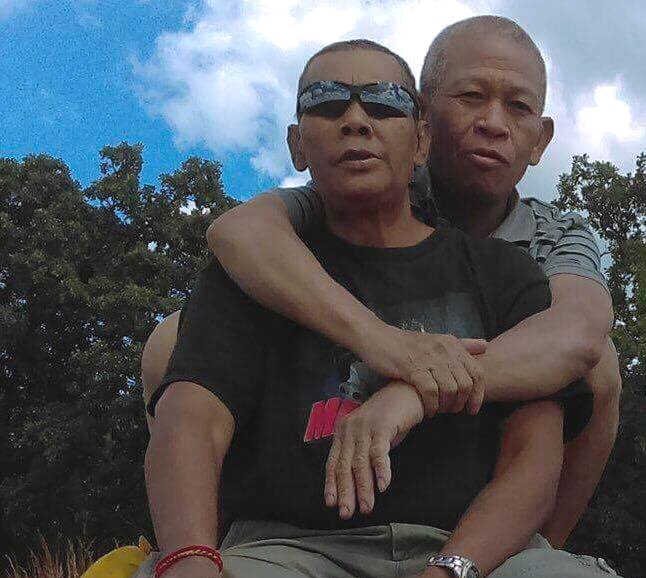“We feel really empty. It’s like a big, missing piece of a puzzle in our life,” Molly Bennett tells Madison365. “We have a routine with him coming home and being with his grandchildren and being able to spend family time with us. And now he’s gone. And we have no idea what’s going to happen.”
Bennett’s father, Sophal Chuk, was taken away by U.S. Immigration and Customs Enforcement (ICE) early Friday morning. Chuk, who has been a Madison resident for 33 years, is currently in a jail cell and will potentially be deported to Cambodia.
“They picked him up at work and brought him to Milwaukee and then processed him in Dodge County,” Bennett says. “They went to see him today in Juneau but the family wasn’t able to see him because they said that they didn’t have the family on paper and they needed a 24-hour clearance. So the family has yet to see their dad.”
Chuk is 67 years old, does not speak English, and has mental and physical issues – including a knee injury – that need medical attention.
“My dad was a refugee coming from Cambodia. He came to the United States in 1985. He’s been living here for 33 years,” Bennett says. “He was a huge part of our life as he raised his three kids and he’s a big part of his grandchildren’s lives, too.”
Chuk is a part of the local Madison Khmer community and a longtime member of Freedom Inc.
“We have no idea right now when they are moving him out or when they are deporting him,” Kazbuag Vaj, co-executive director of Freedom Inc., tells Madison365. “We’ve been working with Sophal for the past three years, but his family has been a part of the Madison community for a very long time.
“He is dealing with a knee injury and he has other health issues,” Vaj adds. “So when they took him, he had not taken his medication so they had to take him back to his house to get his medication because he really needed it.”
Cambodians entered the United States as refugees after the Khmer Rouge, led by Pol Pot, won a civil war that had raged from March 1970 to April 1975 and proceeded to rule the country with extraordinary brutality. A few Cambodians managed to escape but it was only after the regime was overthrown in 1979 did large waves of Cambodians began immigrating to the US as refugees.
“The majority of the Khmer folks that are in the U.S. are refugees and came after the bombing during the war during the Pol Pot regime in Cambodia,” Vaj says. “So many of these family members no longer have family in Cambodia. And there are many who are deported who don’t speak the language at all.”
ICE officials told Madison365 that Chuk was lawfully admitted to the U.S. in 1985, but was convicted in 1989 for sexually assaulting a minor in Illinois and was sentenced to 10 years in prison. As a result of that conviction, Chuk lost his legal status in the United States; and a federal immigration judge issued Chuk a final order of removal (deportation order) in 2004.
“Chuk has been reporting periodically to the ICE office in Milwaukee under an order of supervision, while ICE works to obtain a travel document from Cambodia. Chuk was notified in 2004 that the U.S. government intended to remove him to Cambodia, per the judge’s order, and would continue to do so while the deportation order was active,” Shawn Neudauer, Public Affairs Officer for Department of Homeland Security of U.S. Immigration and Customs Enforcement (ICE), told Madison365 in a statement. “Chuk was recently arrested by ICE in order to complete the process of obtaining a travel document to Cambodia, as part of his 2004 removal order.”
However, Vaj says that deporting these individuals back to Cambodia is basically a life sentence as many of them have fled as refugees and have no place to go back to. Most of the deportees entered the United States as refugee children fleeing the genocidal Khmer Rouge with their families, and many have never been to Cambodia and don’t speak Khmer. On April 5, 51 Cambodian Americans were deported.
“The reports said that of the people who were deported during that last round, the majority are people with mental wellness issues who have physical needs and disabilities,” Vaj says. “We’re thinking that ICE is no longer interested in who they deport; they’re just deporting everybody. This is an escalation against this community.”
A few years ago, Vaj says that she went to Cambodia and was able to talk to many of the people who were deported.
“Once they get deported, life is very hard. There’s no infrastructure in Cambodia to take back folks who’ve been deported,” Vaj says. “There’s actually a huge stigmatization about being deported back the country that they fled,” Vaj says. “So we’re really, really concerned about Sophal’s well-being if he is deported.”
Is there anything concerned citizens do?
“I think we first need to get the community aware that this is happening to the Cambodian community and has been happening for a long time. We need to get elected officials aware that this is happening,” Vaj says. “Another strategy is to look at what other communities are doing to stop the deportation process itself. We’re looking at legal remedies to see how we can help the families with that.
“It’s devastating for the families,” she adds. “His family depends on him as a grandfather. This is the only family he knows here in Madison.”
Bennett is really worried about her father’s mental issues and not being able to talk to him or comfort him.
“I just want him at home. He has mental issues that need to be attended to and his doctor knows it, too,” she says. “He should be with us. He has bad knees that collapse on us and has been getting random fevers.”
Bennet and her father had big plans to celebrate the Khmer New Year, but instead of spending the weekend with his family as he had planned, he is now spending it in a jail cell awaiting an uncertain fate.
“The day he was picked up was the start of our [Cambodian] New Year in our culture. That is during a time that we’re all supposed to spend together as a family. It’s been so hard on us. Knowing that fact that he can’t be at home with us to celebrate the New Year this weekend coming up, it’s going to be so hard,” Bennett says, fighting back tears. “He’s been in our lives forever and we’ve been able to do everything as a family. It’s terrible. We are feeling so empty and sad right now.”
(This story has been updated with a statement from U.S. Immigration and Customs Enforcement (ICE) -Ed.)



































